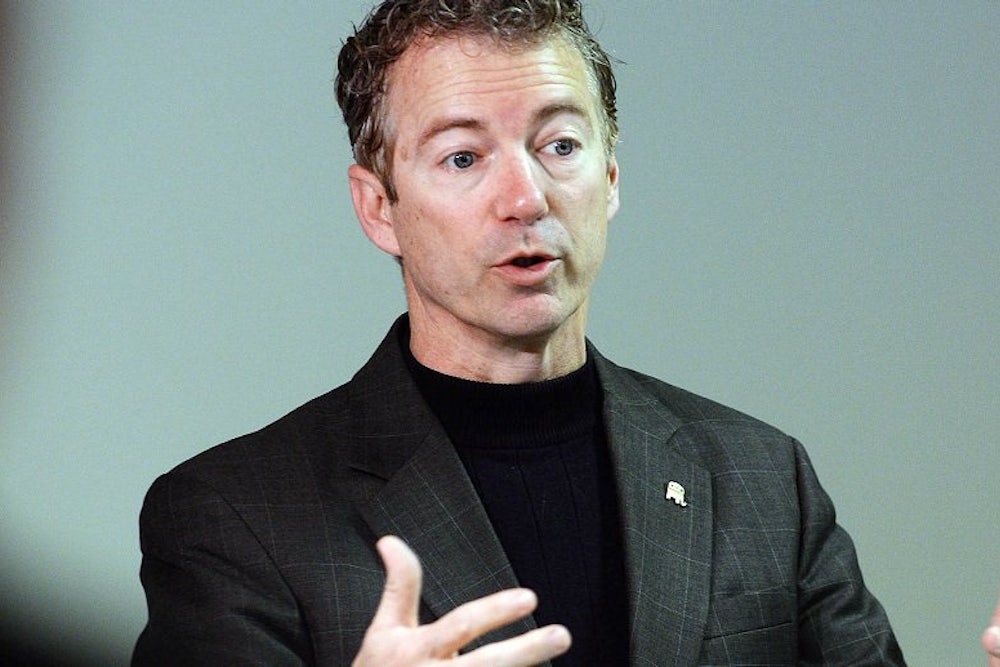Nearly a week since Indiana Governor Mike Pence signed the Religious Freedom Restoration Act (RFRA), igniting a nationwide debate about whether the controversial law invites discrimination based on sexual orientation, most potential Republican presidential candidates have taken the opportunity to bolster their conservative credentials.
"Governor Pence has done the right thing," said former Florida Governor Jeb Bush on Monday.
“I want to commend Governor Mike Pence for his support of religious freedom, especially in the face of fierce opposition,” Texas Senator Ted Cruz said in a written statement. “Governor Pence is holding the line to protect religious liberty in the Hoosier State. Indiana is giving voice to millions of courageous conservatives across this country who are deeply concerned about the ongoing attacks upon our personal liberties. I’m proud to stand with Mike, and I urge Americans to do the same."
Ben Carson, former Arkansas Governor Mike Huckabee, Florida Senator Marco Rubio, Wisconsin Governor Scott Walker, Louisiana Governor Bobby Jindal, former Pennsylvania Senator Rick Santorum, former Hewlett-Packard CEO Carly Fiorina, and former Texas Governor Rick Perry all expressed their support for Pence and Indiana's RFRA law. (Meanwhile, Democrats Hillary Clinton and Martin O'Malley have come out against it.)
But two likely 2016 candidates have been notably absent from this debate: New Jersey Governor Chris Christie and Kentucky Senator Rand Paul. What do they think about the law, and why have they been so quiet on the issue?
Samantha Smith, the communications director for Christie’s Leadership Matters for America PAC, did not return a request for comment on Wednesday morning. (I'll update this if I hear back.) Christie’s past statements offer little light on where he will fall on the issue, but he has been shifting to the right on social issues in advance of the Republican primary. On Tuesday, he announced his support for a 20-week abortion ban. Given Christie’s shaky position within the party, and the fact that the rest of the field supports Indiana’s law, it would be very surprising if he joined with liberals in opposing it.
As for Paul, Sergio Gor, the communications director of RandPAC, wrote in an email, “The Senator is out of pocket with family this week and has not weighed in at this time.”
It makes sense that Paul is unplugging with his family this week: He's expected to announce his presidential bid on April 7, the beginning of a long, grueling journey—and a victory would mean that these are his last moments of real privacy for a very long time. Could anyone blame him if he wanted to spend a few quiet days with his family? I couldn’t.
But it also seems a bit convenient that Paul is entirely unreachable while the controversy swirls. If his campaign launch is just six days away, surely Paul and his staff are in close communication. How long does it take to send a tweet or tell your staff to craft a statement?
It will be interesting to see how Paul reacts to the law—as he'll be forced to do, probably no later than April 7—in light of his libertarian credentials. If he stuck true to them, not only would he support the law but also support the right of Indiana’s businesses to discriminate against LGBT people, something that the rest of the Republican field opposes. (They just disagree with liberals about whether Indiana’s law would allow discrimination.)
But if recent history is any guide, don’t expect Paul to stick true to his libertarian roots. Almost whenever he has faced a choice between traditional libertarian positions and mainstream Republican positions, he has chosen the latter in hope of winning the GOP nomination. Just recently, for instance, he called for more defense spending after saying for years that the military was bloated and needed further cuts.
In fact, Paul has already reversed himself on whether private businesses should be allowed to exclude people from their establishments for any reason. “I think it’s a bad business decision to exclude anybody from your restaurant,” he told the Louisville Courier-Journal in 2010. “But, at the same time, I do believe in private ownership.” He continued, “In a free society, we will tolerate boorish people, who have abhorrent behavior, but if we're civilized people, we publicly criticize that, and don't belong to those groups, or don't associate with those people.” Just a few years later, as that position became controversial, Paul (dishonestly) said that he never held the libertarian position to begin with.
So while it is taking a while for Paul to give his position, it isn’t hard to deduce where he’ll eventually fall. Maybe he’s just waiting until the spotlight on Indiana dies down a bit, so that his libertarian supporters are less aware when he adopts the party line. But if that's his plan, it's not very presidential.
